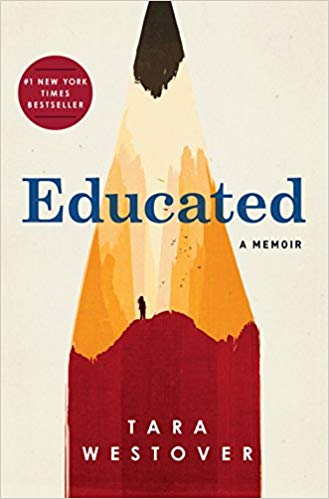It happens this way …
 I just finished reading Educated: a memoir by Tara Westover and I can’t remember the last time a book has so unnerved me. It is a well-written, provocative, and disturbing story that helped me understand why certain groups of women in this country believe what they believe: that “boys will be boys,” men rule the world, and that they have little worth other than being servants of the family.
I just finished reading Educated: a memoir by Tara Westover and I can’t remember the last time a book has so unnerved me. It is a well-written, provocative, and disturbing story that helped me understand why certain groups of women in this country believe what they believe: that “boys will be boys,” men rule the world, and that they have little worth other than being servants of the family.
Since the publisher brilliantly summarized the book, I’ll borrow its words:
Tara Westover was seventeen the first time she set foot in a classroom. Born to survivalists in the mountains of Idaho, she prepared for the end of the world by stockpiling home-canned peaches and sleeping with her “head-for-the-hills bag.” In the summer she stewed herbs for her mother, a midwife and healer, and in the winter she salvaged in her father’s junkyard. The family was so isolated from mainstream society that there was no one to ensure the children received an education, and no one to intervene when one of Tara’s older brothers became violent. As a way out, Tara began to educate herself, learning enough mathematics and grammar to be admitted to Brigham Young University. Her quest for knowledge would transform her, taking her over oceans and across continents, to Harvard and to Cambridge. Only then would she wonder if she’d traveled too far, if there was still a way home. With the acute insight that distinguishes all great writers, Tara Westover has crafted a universal coming-of-age story that gets to the heart of what an education offers: the perspective to see one’s life through new eyes, and the will to change it.
What is not mentioned here is how Tara’s parents, chained by their internalized beliefs about the world, cast her an evil person for leaving a family that has spiritually, emotionally, and physically abused her. Even though she will excel at Cambridge and eventually earn a Ph.D., she still longs for connection to this dysfunctional clan and doubts every outsider who attempts to affirm the intelligent woman she is becoming. Even when her parents “rewrite” her history – challenging her memories of abuse by substituting their more benign ones – she still searches for “a way home.”
What shocked me awake was the power of brainwashing. When parents, churches, schools, governments collude to define who a child is and where his or her place in the world is, how does one break free?
I’ve spent decades washing my brain of those beliefs that programmed me since childhood: beliefs about what is right and wrong, about what it means to be a woman and a compassionate human being, about what the Divine is and how It manifests in the world and in each of us.
This is a work-in-progress because my internalizing has been strong. Yet, I want to believe because I believe, not because I’ve been told what I should believe. While both may lead to the same conclusions, the latter is the realm of childhood, the former the empowerment of adulthood.
Even when Tara crosses oceans and achieves academic acclaim, she still perceives herself as the evil daughter of righteous Idaho survivalists. How strong the chains that bind her, how miraculous – even though it takes years – that she finally breaks out of them. Her story makes me feel compassion for women in this country who don’t even know – or can admit – they are chained. It challenges me to continue to discover and break free of my own.

Leave a Reply